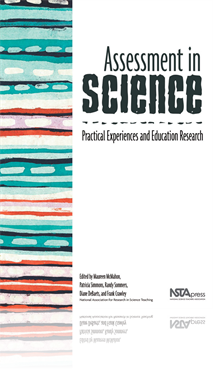All Book Chapters
Book Chapter
Evolving Ideas: Assessment in an Evolution Course
As science instruction moves from lectures that emphasize lists of facts to more student-centered approaches that emphasize knowledge generation and justification, it is clear that assessments must also change. The assessment instruments developed fo...
Book Chapter
Integrating an Assessment Plan Into A K—12/ University Engineering Partnership
A comprehensive assessment plan is a valuable component of a university’s K—12 outreach effort. The K—12 Engineering Outreach Initiative has integrated an assessment plan into each stage of its outreach—development, implementation, and sustai...
Book Chapter
Varying Instructional Methods and Assessment of Students in High School Chemistry
New content standards call for the implementation of new and varied pedagogical interventions and instructional techniques. An experimental project in which chemistry was taught using new pedagogical and assessment standards with 10th- to 12th-grade ...
Book Chapter
Performance Assessment Tasks as a Stimulus for Collaboration Among Preservice and Inservice Teachers
The Performance Assessment project was a collaboration initiated by a university team of instructors and a local school district in which inservice and preservice teachers developed and implemented science performance assessment tasks during a one-se...
Book Chapter
Assessment in Support of Contextually Authentic Inquiry
If research into the assessment of science learning is going to make a difference for teachers, it must be applicable to the realities of K—12 classrooms. This research study conducted in urban elementary schools focused on how students and teacher...
Book Chapter
Helping Students Understand the Minds-On Side of Learning Science
This collaboration between a fourth-grade teacher and university researcher resulted in the development of the Cognitive Strategies Inventory, an assessment instrument targeting writing, discussing, computing, reading, public speaking, and problem so...
Book Chapter
Revised Views of Classroom Assessment
The Classroom Assessment Project to Improve Teaching and Learning (CAPITAL), a collaborative research initiative between Stanford University and middle school science teachers in nearby school districts, examined classroom-based assessment in science...
Book Chapter
Moving Beyond Grades and Scores: Reconsidering Assessment Feedback
Many teachers are concerned about providing feedback to students in ways that support student learning. Five middle school teachers, part of the Classroom Assessment Project to Improve Teaching and Learning (CAPITAL), explored classroom-based assessm...
Book Chapter
Mind Mapping as a Flexible Assessment Tool
Mind mapping, a visual tool to improve note taking, foster creativity, organize thinking, and develop ideas and concepts, was the focus of this research project with middle school students. The efficacy of mind mapping as a teaching, learning, and as...
Book Chapter
Developing Assessment Items: A How-to Guide
Many current high-stakes accountability measures take the form of traditional test items. While traditional forms of assessment may not be the best method to assess all important skills and knowledge, teachers should learn how to construct these kind...
Book Chapter
Assessment in Support of Conceptual Understanding and Student Motivation to Learn Science
Classroom-based assessment strategies may influence the development of conceptual understanding and motivational beliefs among elementary learners in science. A contextual analysis of how young children (65 second graders) responded to classroom-base...
Book Chapter
“Adaptive inquiry” is the product of the synergistic relationship between what a student brings to the classroom, the teacher’s ability to shape a lesson in response to the needs of the student, and the method of final assessment. This new form...
Book Chapter
Science Standards Influence Classroom Assessment Practices
School districts and individual schools must place a premium on linking classroom instruction, science content standards, and classroom assessment. In this study, the authors examined the influence of national science standards on middle school scien...
Book Chapter
Usable Assessments for Teaching Science Content and Inquiry Standards
This chapter reports on an approach to developing middle school science assessments using a learning-goals-driven design model. The design process for creating usable assessments that are aligned with curriculum and important science content and inqu...
Book Chapter
Using Rubrics to Foster Meaningful Learning
Since its inception in the mid-1980s, the Science Education for Public Understanding Program (SEPUP) at the Lawrence Hall of Science (University of California-Berkley) has developed an array of “issue-oriented” instructional and assessment materi...


